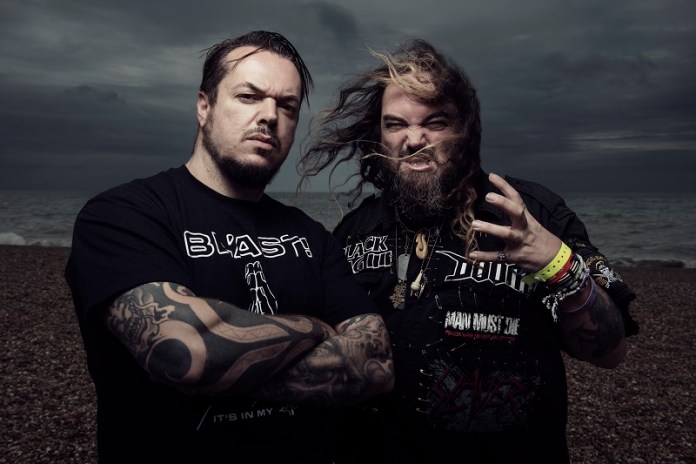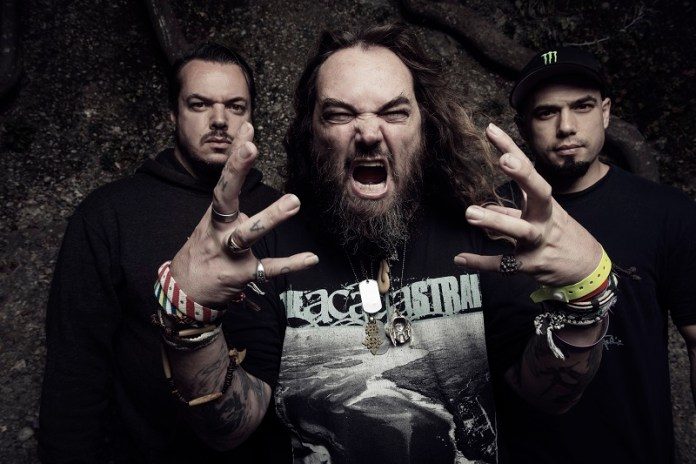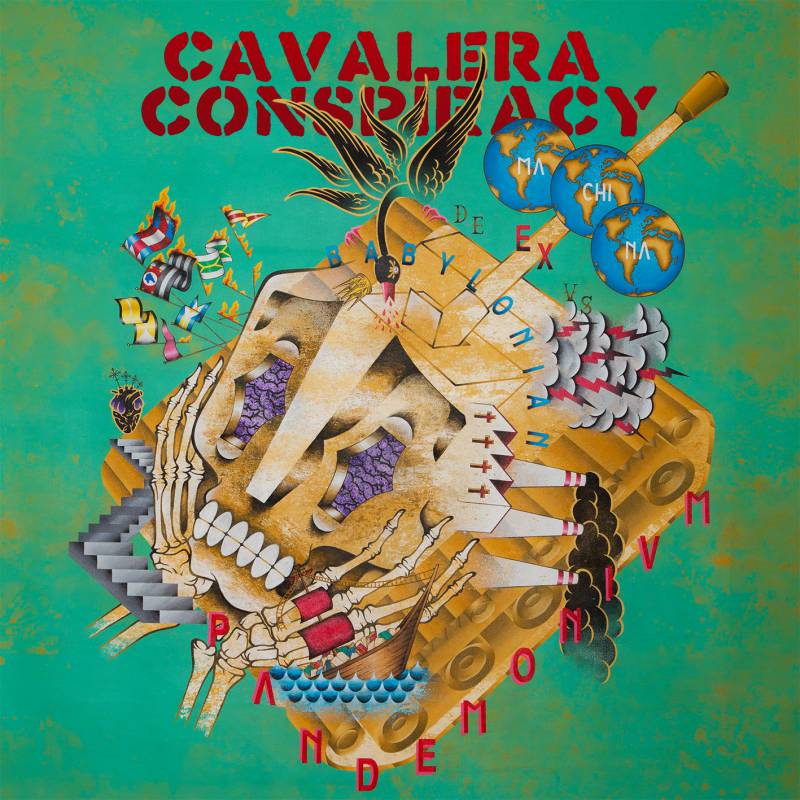If anybody can boast of putting his country in the map of metal, that’s Max Cavalera. Despite Brazil having plenty of metal to go around, it wasn’t until Sepultura that people outside of the country realized that Brazil had much more to offer in the music market than just samba.
Despite having left Sepultura in 1996, Max has stayed connected to heavy metal, collaborating with other artists as well as starting his own bands, Soulfly, Killer Be Killed and Cavalera Conspiracy. Since every single one of his musical adventures has been unique in its own way, the chance to talk to him was, of course, something I couldn’t just pass on.
All photos by Tom Barnes, courtesy of Napalm Records-

MB: All of your projects, Sepultura, Cavalera Conspiracy (CC), Soulfly, etc., have been very different. These differences are also manifest in the lyrical contents of the music; Sepultura and Killer be Killed, for example, dealt a lot with political issues, Soulfly dealt with religiosity and spirituality, etc. How important do you feel is the lyrical content in the music?
Max: A lot of times I listen to music and I don’t even know what they’re singing about, especially in the case of death metal. Sometimes I feel curious and I translate some of the lyrics, but I think that I always pay more attention to the musical side. I like lyrics, but sometimes it can be a pain in the ass to come up with new subjects, to try not to repeat yourself, etc. I mean, after 30 years it’s kind of hard because there are just so many words you can use, so you end up repeating yourself.
In general, I pay more attention to the music, to the riffs; I love riffs. I listen to some death metal bands that talk a lot about satanic shit and things I don’t agree with, but I like the music so much that I don’t really care. I kind of block that side and just dig the music and don’t worry about what the lyrics say.
Although I do spend some time with the lyrics so as to make as cool lyrics as possible, I mostly like the musical side of the process.
MB: I read that when you started with Sepultura one of the things that shifted your attention was listening to Venom, which you felt was something like “the Devil’s Motorhead”, and that really moved you to heavier music. And it goes to what you said about separating the music from the lyrics with which you may have disagreed.
Max: Yeah, I liked the music a lot, and I’m not going to let the lyrics ruin it for me. I don’t let that happen; sometimes I don’t care about what the guy is saying, because the music side is really killer.
MB: Let’s talk about Pandemonium, Cavalera Conspiracy’s new release. I’ve always felt that CC is, in a way, a return to your musical roots, in the sense that it truly conveys the same raw power from those teenagers in Brazil who were eager to play harder and harder stuff. This time around, actually, I heard that it was so hard that there was a little incident in the recording process involving some neighbor calling the police. What happened exactly?
Max: It was fun to make this record, because it was good to go back to play fast again, the music that Igor and me started playing as kids. What drew us together back then was aggressive music, so to be able to go back and do an aggressive album again was really cool. I really enjoyed it.
The thing with the police was a first for us. We were recording the drums, and we were playing so hard that the walls of the house were shaking, because this was done in a house, and not in a studio. The guy next door couldn’t sleep because of the noise coming from the room, so the police showed up in the studio, which I thought was great. For me there was nothing cooler than that, I just wish I had recorded the conversation with the cops to use it as an intro to the record. The conversation between the cops and the audio engineer was the only thing we missed in this album, explaining “we’re just playing drums, we’re almost done“, etc.
MB: After all of these years as a metalhead, is this really the first time an angry neighbor complains about the noise?
Max: Yeah, because most of the other records we’ve done in a studio, so there are no neighbors there!
MB: I read that you didn’t want to produce the music too much, and that you wanted to give it a more “raw” sound. Why did you want this?
Max: The album remembers the “dirty” records of the late 80’s and early 90’s, things like Entombed‘s Left Hand Path, Carcass’ Symphony of Sickness, or Napalm Death‘s Scum. They had this kind of really heavy, dirty and ugly sound; they were not cute, polished rock records. If you want to hear a polished record go listen to Metallica‘s Black Album, that’s a polished rock record. We’re not making this kind of record, we’re making a brutal, raw and intense record.
We did this on purpose; it was not supposed to sound clean. It was a deliberate choice to sound dirty and fucked up. I like that, I love the sound of those records, and I wanted to create an album that kind of sounded like that.
MB: Many musicians that I’ve spoken with mention that one of the problems in modern metal is that, perhaps because of the technology now used in studios, albums end up sounding the same. You have very different music, but the production sort of ends up making all the bands sound the same. So, when a band like yours decides to try something different and move away from those same sounds, it’s very refreshing.
Max: I read some stuff on the internet where some people are complaining a little bit about the production, saying that it sounds too low and dirty. And well, yeah, it does! We did it on purpose! I was surprised to see that some people reacted like that.
I rather have an album that sounds dirty and raw instead of one that sounds like everybody else; stuff like ProTools makes all the records sound the same, so we wanted to avoid that.
MB: That’s interesting, because I didn’t feel that it was badly produced, but rather that it was a stylistic choice to sound different.
Max: With every record there will be someone who will talk badly about it; it has been like that since we did [the first Sepultura album] Morbid Visions [in 1996], when people said we sold out.
MB: With Morbid Visions?!
Max: Yeah, they said we weren’t death metal anymore. What the fuck can we do?
I told the band that we can’t let those guys influence us or put us down. We just had to do what we do, believe in what we do and keep going. We did that and we went on forever with that mentality.
With every record we heard criticisms, with Chaos A.D., with Roots… it comes with it. You gotta learn to take the criticism; if you believe that your material is strong enough and you believe in it, then you can take the criticism and roll with it. This is what happens with Pandemonium; I like the material, I like the record and I stick behind the idea of a “dirty” record.
MB: After all of these years, what’s the relation that you have in regards to what critics or fans say about your music? At some point you stop caring?
Max: Well, it’s good to read criticisms, even bad ones. Sometimes they make you pissed off and they make you want to do something about it. Back in the days with Sepultura, I used to collect bad reviews and read them before the show so I could get really pissed off. I’d read a bunch of reviews where people talked shit about us… and go “let’s just show these fuckers what’s up!”. I’d go out and have a great show because I was pissed off about the reviews. I guess that’s the good side of it! [laughs]
MB: Have there been times when you read negative reviews and think that maybe they’re right?
Max: A couple of times. You can always go back and wish you could have changed some things on your records. For instance, I wish the Soulfly album 3 was called Downstroy; I like that name much more, I think it was a lazy idea to call the album 3, not inspiring at all. I read a review that said that, and I agree with it. I should have called it Downstroy, which was the original name.
MB: And why did you change the name then?
Max: I don’t know; it must have been laziness. I thought of Led Zeppelin and Black Sabbath, both of whom had album numbers, and 3 is kind of a cool number, so I just went with it. I have a lot of regret for this.
MB: All things considered, if after all these years your biggest regret is “I gave the album the wrong name”, that says a lot. If that’s all we can come up with, pretty good!
Max: Pretty good right? Not so bad! [laughs]
MB: Let’s talk a bit more about Pandemonium. What can your fans expect from this album?
Max: Musically, it was a motivation to play fast with Igor again. All the songs in the record are fast, all of them have fast parts; this is great, I don’t think I’ve ever done it before, since in a record there are always one or two songs that are slower, or doom or groove. In this record every song is fast; even the groove song, “Not Losing the Edge”, has a big fast part in it.
This is the biggest difference between Pandemonium, Blunt Force Trauma and Inflicted; that everything is fast. That should be a big surprise for anybody that hears it for the first time, they should get a shock.
Lyrically it is not a concept album, so I was able to sing about different topics. “Babilonian Pandemonium” is more of an apocalyptic song about the bible, the end of days, etc.; “Banzai Kamikaze” is about Japanese suicide pilots; “I, Barbarian” is about a Gladiator/300 kind of thing; “Not Losing the Edge” is about growing old and continuing to love heavy and aggressive music as you do; “Crucible” is about the witches of Salem, etc. The subjects are really diverse, they go everywhere. I like to have such an open space to sing about different kinds of stuff.
MB: Speaking of “Not Losing the Edge”, you have been doing this for a long time. Even though Sepultura started in 1984, Pandemonium is very powerful and very hard. As you grow older, is it hard to continue playing the same type of music and to put out the same type of energy in it, without losing the edge?
Max: It’s one of the reasons why I wanted to make the song, to talk about growing old. The rules of the world say that if you grow old you get soft, you become more mellow and boring; I am against that “rule”, it’s a stupid rule.
It’s the same with the people who say that if you have kids you can’t play metal; who the fuck said that? When I had kids I thought that there was no reason to stop doing what I love just because I have kids, that it was stupid. I feel the same way about growing old; you don’t have to. You can still be crazy, love aggressive music and even become more aggressive as you get older. I wish Metallica would have done that, become more aggressive through the years instead of getting softer; I would have liked that a lot more than the path that they chose. Not many bands do that, so I had the option to do it with my own band, so we did it, and it’s something that I had the chance to do with my own life, so I decided to do it.
MB: I take it then that you didn’t like Lulu then?
Max: Oh no man. I did not get that stuff. I know the guy is an icon and all, and there are understandable reasons but… I just didn’t get the music. I don’t know what the fuck was going on there. I listen to new stuff like Noisem and Aborted, and that’s what gets me going. If I put Lulu next to them it’s just a joke.

MB: I really don’t know what the fuck was going through their heads. It’s such a completely different thing from everything they’ve done. I don’t like it, and I don’t get it.
Max: Even if you listen to Load and ReLoad… those are horrible records. I didn’t like them at all. You keep waiting for Metallica to come back to their thrash days, but I don’t think it’s possible anymore. Maybe they made too much money, that might be the problem. That might explain why I have not become commercial, because I don’t make money with this shit; I’m still struggling trying to pay the bills, while touring the world. I still have economic problems at home. When you do that, when you have problems, you write good music. That’s why we haven’t become rich [laughs]
MB: If you listen to Chaos A.D. next to Pandemonium, it’s completely different from what happens when you listen to Load next to Master of Puppets. There are just massive changes in the style of Metallica, something that didn’t happen to you as a musician. You decided to stick to your roots, the heaviness and the aggression, and it’s amazing.
Max: It’s natural. I stick with because that’s how we are in our lives. We choose our paths, and the one I chose for myself is a bit harder, I mean it would be useful to get a big hit on the radio and get big overnight, but there’s something about making things slowly, little by little; there’s more integrity to it, it’s more real. What you get from it is more amazing, and I think that the fans see it.
As you say, when you put an old album next to Pandemonium, and you feel the connection between them… it’s so cool and amazing to still be able to do that after all these years. It’s difficult though, because a lot artists lose that through the years, and they can’t get it back. I’m very glad and blessed that I never lost that. I can still write those songs and make records that I think are relevant for the fans, and full of power, passion and aggression. I’m very happy that I’m able to do it.
MB: One of the things that was perhaps responsible for the power of Sepultura was the work with your brother Igor. Following this family tradition, it’s nice to see that now you also work with your son Zyon in Soulfly. How has it been for you, in these three bands, to mix being a brother/father, friend, colleague and boss?
Max: It’s great. When Gloria and I married and decided that we wanted to have a family, we dreamed that one day the kids would be taking part in the music, that we’d have a big metal family. It’s happening right now. Igor and Zyon have Lody Kong, which I love; Richie has Incite, which are doing great; Zyon also plays with Soulfly, which is really kickass. A lot of people come to the shows just to see me and Zyon playing together. I can’t count how many people come after the show to congratulate Zyon on how good a job he’s doing with the band, because he’s really playing well. He’s really taking things into another level of playing.
For me it’s all a dream come true; when I put Zyon‘s heartbeat in Chaos A.D., that’s the first thing we did. From then, all the way to now, playing together, on tour, recording together, recording with my brother again, it’s all great. It’s all full circle. It’s another dream that I had that I was able to achieve. It’s great.
MB: You’re definitely very fortunate to have been able to work with your family like that. Congratulations on having been able to pull it off after all these years.
Max:Sometimes it’s easy, sometimes you fight with them, sometimes they don’t want to play some songs, and you have to argue with them. It becomes hard to draw a line between “dad” and “boss”, but a lot of the times I have to be more like a boss and just tell him what he has to do.
MB: OR, “you do this because I’m telling you. Go to your room!”
Max: Exactly! [laughs]


